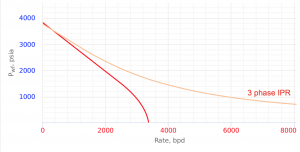Difference between revisions of "3 Phase IPR"
From wiki.pengtools.com
(→Math and Physics) |
(→Math and Physics) |
||
| Line 10: | Line 10: | ||
==Math and Physics== | ==Math and Physics== | ||
| − | ===For pressures between reservoir pressure and bubble point pressure=== | + | ===For P<sub>b</sub> < P<sub>wf</sub> < P<sub>r</sub>=== |
| + | For pressures between reservoir pressure and bubble point pressure | ||
| + | ===For P<sub>wfG</sub> < P<sub>wf</sub> < P<sub>b</sub>=== | ||
| + | For pressures between the bubble point pressure and the flowing bottom-hole pressures | ||
| + | ===0 < P<sub>wf</sub> < For P<sub>wfG</sub>=== | ||
| − | |||
===Oil well IPR equation=== | ===Oil well IPR equation=== | ||
Revision as of 08:20, 11 April 2019
Contents
Three-phase Inflow Performance Relationship

3 Phase IPR Curve [1]
3 Phase IPR calculates IPR curve for oil wells producing water.
3 Phase IPR equation was derived by Petrobras based on combination of Vogel's IPR equation for oil flow and constant productivity for water flow [1].
3 Phase IPR curve is determined geometrically from those equations considering the fractional flow of oil and water [1].
Math and Physics
For Pb < Pwf < Pr
For pressures between reservoir pressure and bubble point pressure
For PwfG < Pwf < Pb
For pressures between the bubble point pressure and the flowing bottom-hole pressures
0 < Pwf < For PwfG
Oil well IPR equation
- Darcy's law equation for the single-phase flow of incompressible liquid:
- Vogel's IPR two-phase flow equation (oil + gas) and it's combination with single phase liquid
- 3 Phase IPR three-phase flow equation (oil + gas + water)
Gas well IPR equation
- Darcy's law gas inflow equation:
- C and n equation
IPR calculator software
- PQplot nodal analysis software is used to calculate the IPR curves. PQplot is available online at www.pengtools.com.
- Excel
- other
Nomenclature
 = formation volume factor, bbl/stb
= formation volume factor, bbl/stb = dimensionless productivity index, dimensionless
= dimensionless productivity index, dimensionless = permeability times thickness, md*ft
= permeability times thickness, md*ft = average reservoir pressure, psia
= average reservoir pressure, psia = average reservoir pseudopressure, psia2/cP
= average reservoir pseudopressure, psia2/cP = well flowing pressure, psia
= well flowing pressure, psia = average well flowing pseudopressure, psia2/cP
= average well flowing pseudopressure, psia2/cP = flowing rate, stb/d
= flowing rate, stb/d = gas rate, MMscfd
= gas rate, MMscfd = temperature, °R
= temperature, °R
Greek symbols
 = viscosity, cp
= viscosity, cp


